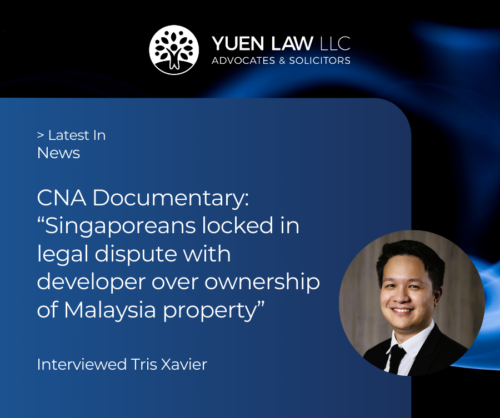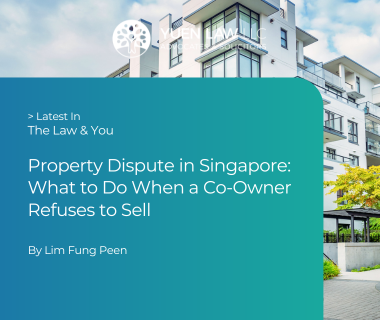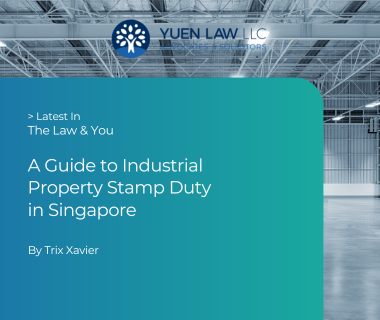For the average Singaporeans, the buying and selling of real estate in Singapore is very likely to be one of the most financially significant transactions in their lives. With the myriad of rules and regulations governing the sales of the real estate and conveyancing processes, the buyer or /seller should consider seeking legal advice from a qualified conveyancing lawyer advocate and solicitor of the Courts in Singapore.

What is Conveyancing?
Conveyancing is a legal term of art, meaning the transfer of legal title of property from one person to another, including the granting of encumbrances (a claim on the property by another party) such as mortgages.
However, the term is nowadays used to refer to the branch of law specializing in the preparation of documents for the transfer of property. The title of a property refers to the bundle of rights in a property in which a party may hold an interest. For houses, titles are split into 2 types:
- Freehold– The owner will enjoy the ownership of the real estate in perpetuity; and
- Leasehold– The ownership of the real estate will revert back to the government after a set period of time. Leases in Singapore can last between 6 months to 99 years. (Leases of 999 years exist too, but are considered equivalent to freehold for all effects and purposes)
In Singapore, titles to a piece of land are registered in a central registry (this is known as the Torrens system, and also practiced in Australia and New Zealand). The Land Titles Register and the Register of Deeds of the Singapore Land Authority handle registered land and common law land respectively. The majority of land in Singapore is registered land.
Under the law, registration in the land title registration is necessary to effect a transfer in the ownership or interest of the land, and a registered title is indefeasible (unless obtained by fraud). Hence, when purchasing real estate, it is essential to have one’s agents conduct due diligence search in these two registries to check if the seller has a valid title to the land before entering a conveyancing transaction.
Who Can Buy Real Estate?
Under the Residential Property Act, a “foreign person” who wishes to purchase a landed residential property is required to seek the approval of the Minister of Law. A foreign person refers to an individual who is not a citizen/PR of Singapore, or a foreign company/converted foreign company. A foreign company refers to a company that is not incorporated in Singapore or has foreign members or directors (even if it’s incorporated in Singapore).
This restriction applies even if the property is received as a gift or inherited from a deceased’s estate. A foreign person who receives property in such a manner is legally required to sell it within a set period of time. However, these restrictions do not apply to foreigners who intend to purchase units in a flat or condominium of 6 or more stories high, as they do not count as landed residential property.
For HDB flats, HDB has a diverse range of regulations governing the eligibility to purchase, depending on the scheme one chooses to apply under, and whether one is applying for a new flat built to order or buying off the resale market. Depending on the scheme one is applying under, one must meet certain criteria with regards to his/her citizenship status, age, or marital status to purchase a flat.
One of the most important regulations one should take note of is the Ethnic Integration Policy and SPR Quota. To prevent the formation of ethnic/PR enclaves, the HDB tightly controls the racial/PR percentages within every HDB block. Hence, should one’s ethnic group be overrepresented within the block, one may not be allowed to purchase that property. Generally, transactions that take place between individuals of the same ethnic group/citizenship status should be unaffected. Buyers and sellers are advised to check the eligibility of their transactions before proceeding.
WHAT IS THE CONVEYANCING PROCESS LIKE IN SINGAPORE?

Option to Purchase
An Option to Purchase (OTP) is a valid and binding legal contract in written form, entered into between a buyer and seller of a residential property. The OTP gives the buyers the exclusive rights to purchase at a fixed purchase price, within a fixed period of time (usually 2-3 weeks). Usually, the sellers of a property may not back out of an OTP agreement and refuse to sell once the OTP is signed, while the buyers may do so. In exchange, the prospective buyers are required to put down a 1% deposit, known as the option fee, which they will forfeit to the sellers if they choose to withdraw from the deal. Hence, both parties are advised to consider carefully before coming to an OTP.
In addition, buyers are strongly advised to carefully do their due diligence to inspect the property they wish to purchase before entering into an Option To Purchase agreement. The legal principle of “caveat emptor” (Latin for “buyers beware”) applies in such situations, as the responsibility is placed on the buyer(s) to make sure that the property is free of defects before purchasing it. Sellers and their agents have no legal obligation to ensure the property is in good condition, although they may not defraud or mislead buyers.
Exercising the Option
If the buyers decide to proceed with the transaction, they may choose to exercise the option to purchase and come to a sales and purchase agreement with the sellers. The conditions of this agreement are generally governed by the Law Society’s Condition of Sales 2012, which is an update to the 1999 Condition of Sales (note that the 2012 Condition does no supersede the 1999 Condition). However, parties may mutually agree to contract out of any, or all of the
Conditions as they may see fit. Usually, an additional deposit of 4% of the agreed purchase price will be paid to a neutral party, such as the Singapore Academy of Law. The stamp duties payable by both parties should be paid within 14 days of signing the sales and purchase agreement.
With the acceptance of Option To Purchase, the buyer’s lawyers may examine the certificate of title, which verifies the ownership of the property by the seller. At the same time, they should make legal requisitions to check using the title search if the property will be affected by any governmental developmental plans. If so, this may invalidate the entire transaction.
Completion
The seller will hand over the keys of the property to the buyer, in exchange for the payment of the remaining 95% of the agreed price. The 4% deposit will also be released by the intermediary to the sellers. The property should be delivered in the same condition (notwithstanding fair wear and tear) as it was on the date of the option or contract, whichever is earlier unless otherwise agreed between both parties.
The seller’s lawyers will also hand over the transfer documents, with the details of the change in ownership of the property, to the buyer’s lawyers. This will allow the buyer’s lawyers to apply for a Certificate of Title with the SLA.
The above rules apply only for private completed residential properties. Do note that when purchasing HDB flats, it is compulsory to use the standard OTP contracts provided. Any other agreements or arrangements made will be deemed invalid under the Housing and Development Act.
For assistance regarding property purchases or Conveyancing processes in Singapore matters, do contact us to make an appointment with our conveyancing lawyer.
More Conveyancing FAQs
1) Can the buyer back out after signing OTP?
A OTP is a valid and binding agreement. If the buyer chooses not to exercise within the option period, he may have to forfeit the option fees unless stated otherwise in the OTP.
After the option period has expired the seller is entitled to keep the options fees, and to sell the property to another buyer.
If a seller backs out after having signed the OTP, the seller has to refund the option fee. Additionally, the buyer may bring about a claim against the seller for specific performance to compel the seller to carry through his obligations under the OTP.
2) Do you need a lawyer to act for you in your conveyancing transaction?
As property purchase is a huge investment, engaging a conveyancing lawyer will help mitigate risk in a conveyancing transaction. The conveyancing lawyer will conduct due diligence checks on the counter party and the property.
The conveyancing lawyer will help to ensure that various payments are made to government agencies on time, and will help to liaise with various parties and government agencies, including the bank you took the loan from, Central Provident Fund, Singapore Land Authority, Housing Development Board and the Inland Revenue Authority of Singapore.
3) What is the difference between a conveyancer and a property solicitor?
In Singapore, conveyancers are qualified lawyers. This is unlike other jurisdictions where a conveyancer need not be a qualified lawyer.
4) How long does it take for conveyancing?
Presuming that the buyer is taking a mortgage loan, or the seller has an outstanding mortgage with the bank that needs to be redeemed before the sale can take place, the entire conveyancing transaction will take about 12 weeks on average.
Where there is no mortgage loan involved, the process can be slightly shorter, subject to mutual agreement by the buyer and seller.

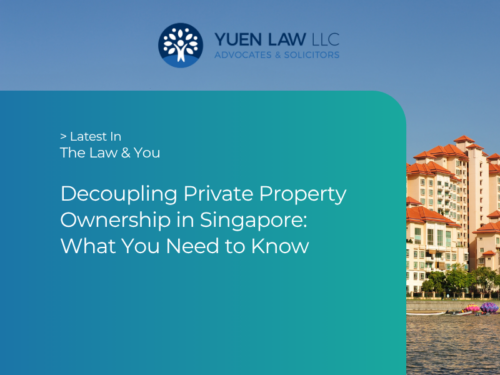
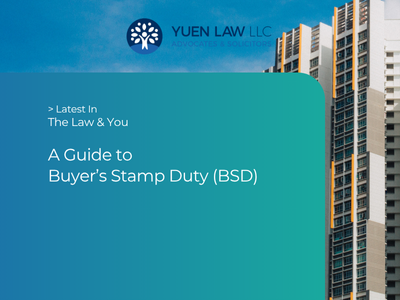
![Yuen Law Acts for Successful Applicant to Order Sale of Co-Owned Property, Sin Chiau Soon v Aitken Robert Bond [2025] SGHC 94 H2](https://yuenlaw.com.sg/wp-content/uploads/2025/06/Yuen-Law-News-Yuen-Law-Acts-for-Successful-Applicant-to-Order-Sale-of-Co-Owned-Property-1-500x375.png)
